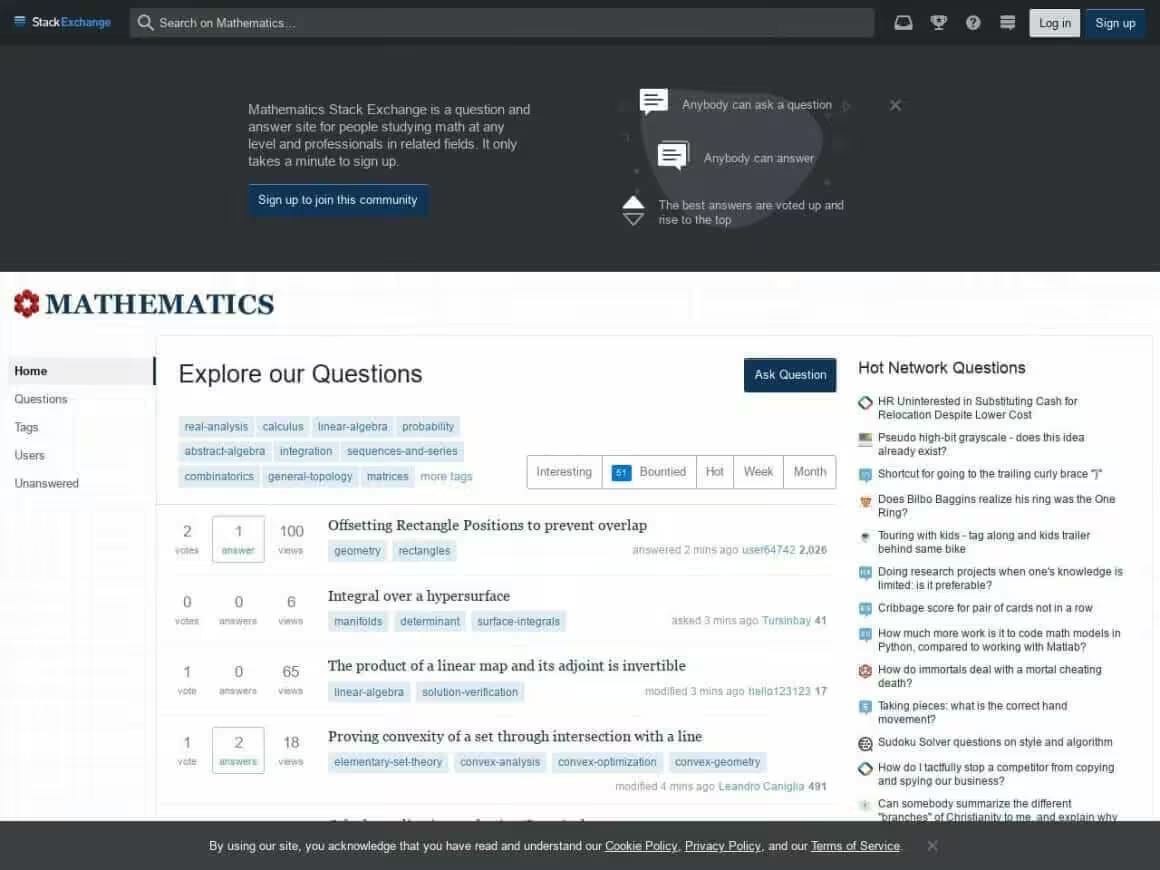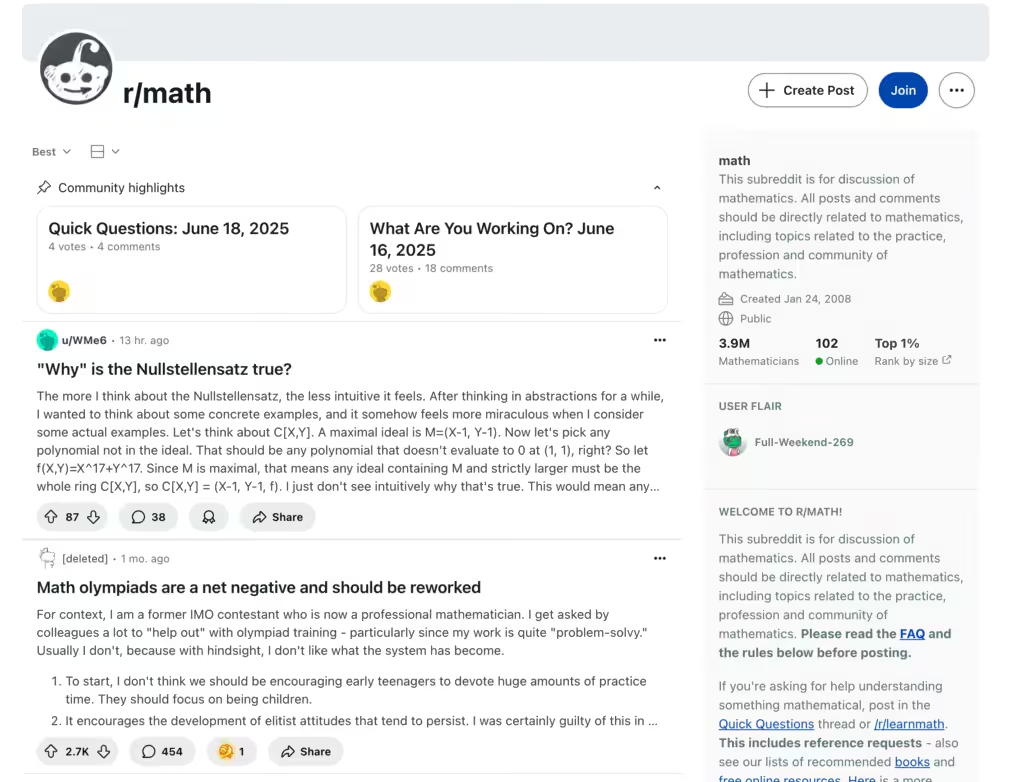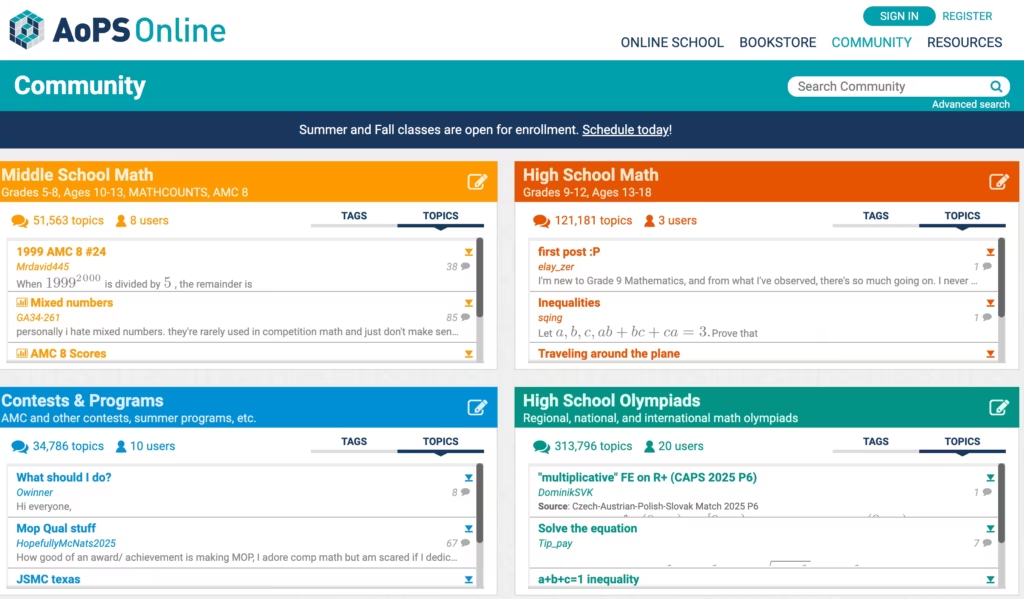15 Best Online Communities a Math Major Should Join
Online communities are groups of web-savvy individuals who share communal interests. A community can be developed with just a single topic or by a bunch of philosophies. A better community binds its members through substantial debates.
Mathematics is a very popular communal interest and there are hundreds of online math communities formed in both Q&A and debate styles.
Some mathematical communities are so immense that they serve two or three discussions every minute. If you are a math student, reader or research scholar then you must join in such places. Beyond sharpening math skills, these communities also help users to connect with other similar minded people.
Joining these online math communities can provide invaluable support and resources for students looking to improve their skills.
The following communities are the largest on the internet and are always worth joining:
In this article →

Mathematics Stack Exchange
This is the most structured, no-nonsense math Q&A community out there. It’s part of the Stack Exchange network and built strictly for math, undergrad level and up.
Ask a question. Add details. Use LaTeX for formulas. And watch experts break it down in ways your textbook never could. The moderation is tight. So don’t expect to post vague homework questions and get away with it.
You’ll see professors, PhDs, Olympiad medalists, and sharp undergrads answering questions here. It’s fast. Brutally honest at times. But this is one of the best ways to level up your problem-solving and proof-writing skills.
What I like:
- Accuracy is king here. Wrong answers are downvoted fast.
- Almost every major math topic has deep discussions already indexed.
- It teaches you how to ask questions, not just answer them.
What to avoid:
- Don’t post questions without effort shown.
- Don’t treat it like Quora or Reddit. It’s a different beast.
r/math (Reddit)

This is where the math crowd hangs out between lectures. Think of it as the watercooler for math nerds, except it has 750k+ members and some surprisingly smart threads.
Here, you’ll find:
- Interesting problems
- Math memes and satire
- News from journals or math Twitter
- Visualizations and proofs without words
- “ELI5” (explain like I’m 5) requests from casual learners
It’s not academic. But it’s fun and often insightful. You won’t always get perfect answers, but the exposure to how people think about math is invaluable.
Why join:
- You get a daily dose of math culture
- Some top-tier explainers pop in often
- Easy to contribute, even with beginner knowledge
Tip: Upvote thoughtful content, not just jokes. It keeps the quality in check.
Art of Problem Solving (AoPS) Community

This is where the best high school math minds go to sharpen their blades. If you’re into Olympiads (IMO, INMO), AMC, or just competitive math in general, this is the place.
The forums are packed with categorized questions, solution threads, and peer discussions. And it’s not just for kids. Many early college students and coaches are active here too.
You can browse problems by topic or by contest. Most have full solutions, and members often suggest alternate methods, some elegant, some brute-force, all valuable.
What makes it stand out:
- Designed for problem-solving, not rote learning
- A great way to discover multiple paths to the same answer
- Zero pressure and highly encouraging
Extras: Their built-in Alcumus system and MathCounts Trainer are bonus goldmines for practice. Use them.
MathOverflow
This is where the big kids play. Research-level math, written by and for professionals. It’s still part of the Stack Exchange family, but don’t confuse it with Mathematics Stack Exchange.
You don’t go here to solve integrals. You go here to explore things like Grothendieck’s work, p-adic geometry, or some obscure lemma from a 1980s paper. The audience is top-tier: professors, postdocs, and industry researchers.
If you’re an undergrad working on a senior thesis or just exploring serious math on your own, you can still learn a lot. But read first. Ask later.
Why it’s worth visiting:
- Exposure to pure math research questions in real-time
- Academic rigor is unmatched
- You’ll find references to papers and books you’ve never heard of
Be careful:
- Don’t post unless your question contributes to the field
- Even researchers have to do homework before posting
Math Help Forum
One of the oldest community-driven math forums still around. If you were solving integrals online in the 2000s, you probably landed here. It’s a traditional forum, threaded posts, usernames, signatures, all that old-school goodness.
The crowd is mixed. You’ll find hobbyists, students, retired professors, and even engineers brushing up. It covers everything: algebra, calculus, stats, even logic and set theory. Answers come slower than Stack Exchange but often with more warmth and step-by-step detail.
Strengths:
- Great for beginner to intermediate learners
- Less intimidating tone than modern platforms
- Puzzles, brain teasers, and academic threads in one place
Weaknesses:
- Interface is dated
- Search function is clunky
- Moderation can be slow
Still, if you want a low-pressure space to work through your questions, or even help others, this is a solid option.
r/learnmath (Reddit)
This is Reddit’s most approachable math community. Unlike r/math, where advanced discussions sometimes dominate, r/learnmath exists for one thing: helping people learn math.
Doesn’t matter if you’re relearning algebra after a decade or studying for a PhD comp. You’re welcome here.
People post:
- Questions they’re stuck on
- Conceptual gaps (e.g., “Why does this limit rule work?”)
- Study plan advice
- Resources and book recommendations
And the replies? Surprisingly helpful. You won’t get roasted for asking a basic question.
Best parts:
- Kind and active community
- Great for self-learners
- Allows you to post without LaTeX or strict formatting
Caution: It can get repetitive. Use the search bar before posting. Many questions are duplicates.
LinkedIn: Mathematicians Group
Let’s talk career. This group isn’t for solving equations, it’s for building a math-centric network. Professors, data scientists, students, and policy analysts, you’ll find a range of professionals sharing jobs, papers, and industry updates.
If you want to stay updated on math events, publishing opportunities, or PhD admissions, this is a good place to lurk. You’ll also spot researchers announcing new papers or commenting on trends in education and academia.
Use it for:
- Connecting with professionals in your field
- Seeing how real-world math careers work
- Finding events, grants, or calls for papers
Just don’t expect:
- Homework help
- Daily engagement (LinkedIn isn’t Reddit)
Number Theory LinkedIn Group
This one’s niche, but valuable, especially if number theory is your thing. While less active than the general Mathematicians group, the posts are more focused and technical.
You’ll see links to journal articles, book releases, lecture series, and academic calls for papers. It’s great if you’re into prime numbers, modular arithmetic, or cryptography and want a tighter circle to follow.
Ideal for:
- Grad students and researchers in number theory
- Professionals in cryptography and theoretical CS
- Getting visibility for your own work
Downsides:
- Not beginner-friendly
- Low post frequency (but quality is high)
PlanetMath
Think of PlanetMath as a math encyclopedia that anyone can contribute to. It’s not just a forum, not quite a blog, and definitely not a Q&A site. It’s a community-driven knowledge base, built by mathematicians, edited like a wiki, and focused on definitions, proofs, and discussions.
Unlike Wikipedia, it leans into formal writing and niche topics. You’ll find well-organized entries on advanced theorems and obscure terminology, often with academic references.
It’s not highly active in forums, but the content is deep and well-written. Good for rabbit-hole reading or verifying technical terms.
Best for:
- Referencing definitions, notation, and proof structures
- Finding resources on underrepresented topics
- Contributing your own write-ups to the math web
Weakness:
- Low interactivity compared to other platforms
- Some content is outdated, but being updated slowly
The Math Discord
Discord has become the new frontier for online communities, and math is no exception. There are multiple public math servers, but “The Math Discord” is the biggest and most active.
You’ll find:
- Homework help channels
- Study groups
- Live problem-solving via voice chat
- Casual discussions on math culture, careers, and tools
It’s unstructured but lively. New questions fly in every few minutes. You can share screenshots, work in LaTeX, or just type informally. Great if you like real-time help or want to feel part of an actual student group.
What works well:
- Fast feedback
- Collaborative problem solving
- Safe space for asking “dumb” questions
Things to know:
- No permanent threads. Once a discussion fades, it’s gone.
- Moderation varies. Not everything is academic.
Quora Math Topics
Quora is a mixed bag. You’ll find absolute gems and total garbage, often in the same thread. But when it comes to long-form explanations and opinions, it has its place.
The math topic is broad. People post conceptual questions, career advice, textbook recommendations, and even abstract research-style discussions. Answers often come from teachers, PhDs, or just passionate learners who love explaining things.
Good for:
- Exploring how different people think about the same problem
- Reading detailed answers with analogies and real-life examples
- Casual browsing during breaks
Avoid it for:
- Technical or urgent help
- Debates (they get messy fast)
AI Math Solvers
AI math solvers are now part of every student’s toolbox. Snap a picture of a problem, and the apps walk you through the steps. Some tools (like ChatGPT, Photomath or Microsoft Math Solver) even offer graphs and alternate solutions.
These aren’t places to ask humans questions, but they’re insanely useful when you’re stuck at midnight and just need a nudge.
Use them for:
- Step-by-step solving
- Visual breakdowns
- Practicing techniques on the fly
Don’t rely on them for:
- Theory, proofs, or deep explanations
- Understanding why a method works
They work best when used alongside the other communities listed above.
Honorable Mentions
These platforms didn’t make the core list, but they’re still worth checking out depending on what you’re into.
Brilliant.org Community
Focuses on interactive problem-solving and concept-based learning. You won’t get help on your assignments, but their comments section under each lesson often sparks great discussion.
Khan Academy Discussion Threads
Not a community per se, but the comments under each math topic can sometimes help clarify concepts. Mostly beginner-friendly.
Telegram Groups
Several public math groups exist for Olympiad prep, research and advanced math. Harder to filter quality, but they move fast. Search with keywords like “math group” or “Olympiad prep” on Telegram.
How to Get the Most Out of These Communities
- Don’t lurk forever. Post something. Even if it’s a small doubt or a half-solved problem. Posting accelerates learning more than just reading.
- Be specific in your questions. Write what you’ve tried. Add formulas. Use LaTeX or clear formatting. Vague = ignored.
- Avoid dumping screenshots. Especially with zero context. Platforms like StackExchange or Reddit expect some effort. Respect the format.
- Follow up. Always. Someone took time to help you. Thank them. Clarify if it worked or not. That’s how you build real connections.
- Contribute when you can. Answer others, even if you’re unsure. Teaching reinforces what you know. You’ll also spot gaps in your own understanding.
- Bookmark threads. Revisit them. Good answers don’t expire. Keep your own mini library of links, notes, and solved doubts.
FAQs
What is the best online community for college math students?
Mathematics Stack Exchange is the top choice for college-level math. It’s well-moderated and filled with experts who answer detailed questions quickly.
Where can I get help with high school math problems?
Try the Art of Problem Solving (AoPS) community or Math Help Forum. Both are beginner-friendly and focus on step-by-step problem solving.
Is Reddit a good place to learn math?
Yes. Subreddits like r/math and r/learnmath are great for casual discussions, concept explanations, and engaging with fellow learners.
Are Discord servers helpful for math students?
Yes, especially if you prefer real-time help. The Math Discord server has homework channels, voice chats, and a large active community.
Where can I discuss advanced math topics or research questions?
MathOverflow is built for research-level mathematics. It’s best suited for grad students, professors, or those working on academic math problems.
Can I use AI tools like Socratic to study math effectively?
AI tools like Socratic, Photomath, and Microsoft Math Solver can help with step-by-step explanations, but they work best alongside human communities.
Is Quora reliable for math help?
Quora can be useful for conceptual explanations and opinions, but always cross-check information. The quality of answers varies.
What’s the most beginner-friendly math community online?
r/learnmath is a safe and welcoming space for beginners. You can ask any math question without fear of judgment.
Can I network with math professionals online?
Yes. LinkedIn groups like ‘Mathematicians’ and ‘Number Theory’ are excellent for academic networking, job postings, and research updates.
How do I get the most out of a math community?
Be active. Ask specific questions, contribute answers, follow up with feedback, and use each platform’s features properly—like LaTeX support or tagging.